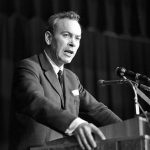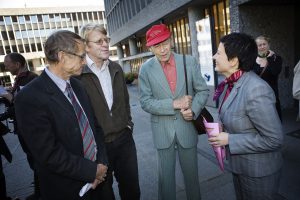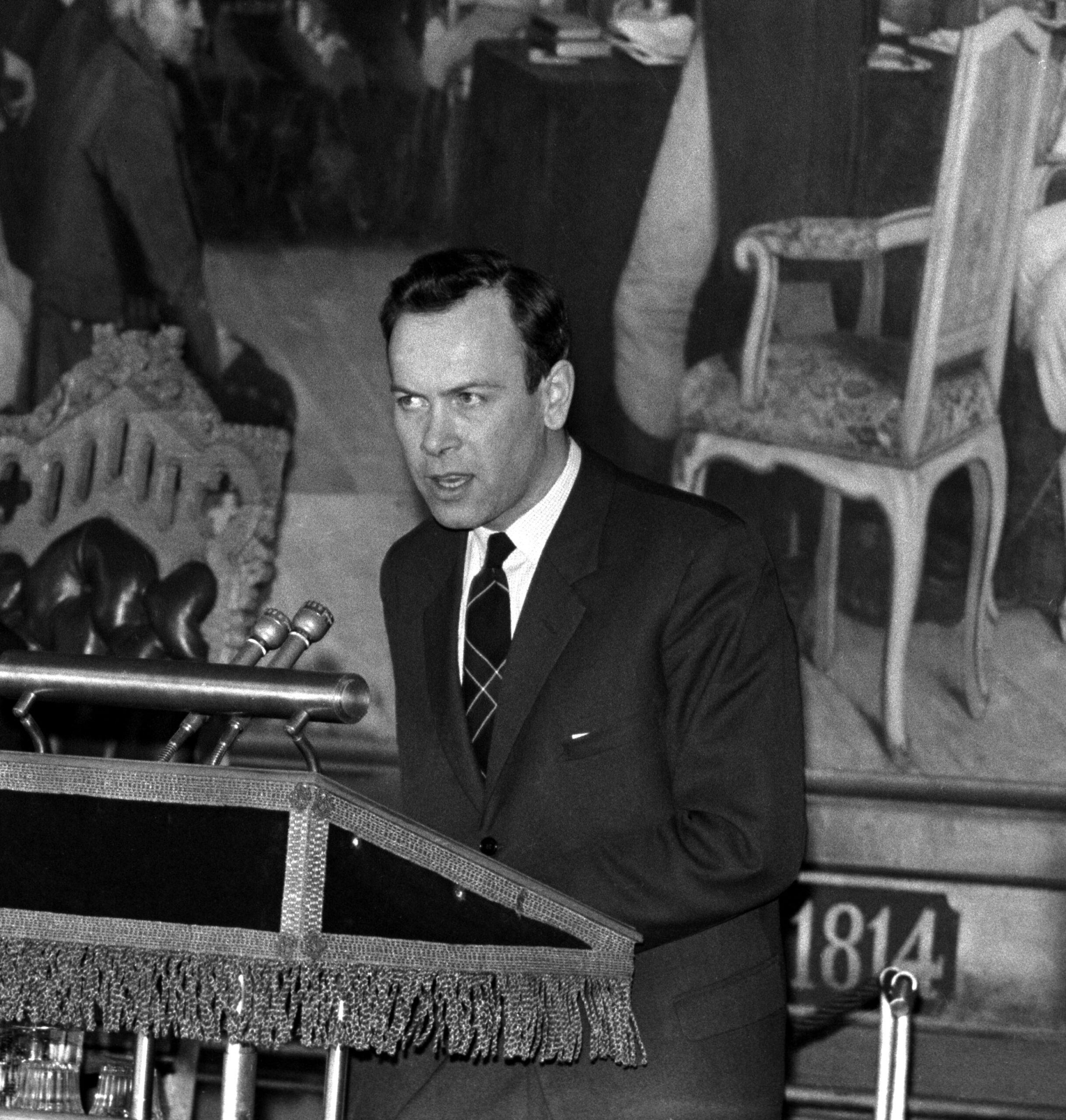(THIS ARTICLE IS MACHINE TRANSLATED by Google from Norwegian)
Ny Tid brings here the obituary of Gunnar Garbo, written by his friend for 55 years, Halle Jørn Hanssen.
Gunnar Garbo is dead. He was a mountain man, a Norwegian, a European and a citizen of the world. Gunnar was born in Bergen 19. April 1924 and died 29. June this year at Nesodden. His parents, Sara and Ingvald Garbo, came from small groups, and the family experienced how hard the 1920 and -30 years were for ordinary people. His father Ingvald had, in poor condition, been able to take his associate's degree. His profession was history and European languages. At the same time he wrote for Bergens Arbeiderblad and Dagbladet, and he was one of the very first in Norway from 1934 to spring 1940 who strongly warned against Hitler and the rise of Nazism and fascism in Europe. He was at the same time an uncompromising advocate for democracy, tolerance and human dignity. Such topics were of course also the topic of conversation in the family. Gunnar Garbo thus gained early insight into how politics can shape a society in a good or bad direction.
When the Germans invaded Norway, they also started in Bergen the survey of persons who could undermine their authority. The Germans initially did not know about Ingvald Garbo's business, and he was arrested by chance 8. October 1941. But in the days that followed, the Germans discovered what he stood for, and he underwent harsh interrogations where he stood against a rock. He was then tried before German law, sentenced to death and executed 22. November 1941. Three days before the execution, his father wrote a short, very personal and warm letter to his son Gunnar that ends with these words:
'Now I'm leaving you. Don't be mad at me for that.
I wish you a rich and happy life, my boy.
I trust you now more than ever.
Father"
I am convinced that had his father had the opportunity to see Gunnar's life, he would have been very proud of his son.
Gunnar was 17 years when his father was executed. The family was like the lamb for a few days, but then Gunnar took up the legacy. He wanted to fight with the word like, weapons. Gunnar became an opponent and went into the Home Front in Bergen where making illegal newspapers became his special area of responsibility. Two years later, anglers were on their way, and he was ordered to flee to Sweden. There, he first wanted to join the Norwegian intelligence service, but chose to join the police forces.
7. May 1945, along with thousands of other police officers on trucks that entered Norway prepared for battle if necessary, but they found a nation in unrestrained celebration. Gunnar served for a few weeks in Oslo.
In the early summer he was back in Bergen and got a 21 year old job as a journalist in Bergens Tidende. As a journalist, he traveled extensively in Europe and, as one of the few Norwegians, gained an insight into what the ravages of war had done to people, culture and nature. He was horrified at what he saw, and he conveyed this in his articles. In this way, journalist Gunnar Garbo became a well-known and respected young man in Bergens Tidende's readership. He elected the Liberal Party as his party, and in the autumn 1945 was elected to the Bergen city council. A few years later he was asked to take up the job as chief editor of the left-wing newspaper NIDAROS in Trondheim. Shortly after coming to Trondheim, he was also elected to the city council.
I have read Gunnar Garbo's folder at the surveillance police, and something more bland and banal than what was there, I have hardly read anywhere.
The politician. In the summer of 1957 he returned to Bergen when he was nominated as 1. man on Left's list for the Storting elections. He quickly became one of Left's leading politicians. At the Left's national meeting in the spring of 1961, he was the leader of the opposition in the party that said no to nuclear weapons on Norwegian soil. We who participated in the opposition at the national meeting won the vote by an overwhelming majority.
Three years later, Røiseland said no to re-election as the Left's chairman, and Gunnar Garbo was a unifying candidate when he was elected as new leader at the 1964 national meeting. As a party leader, he was both a visionary and an accomplished strategist and he led the Left Labor Committee and the National Board in working with the party program that moved the Left to the left and the strategy that would make the Left the electoral winner in 1965. At the same time, he was loyal to the party's belief that the country needed a democratic shift after 20 years with the Labor Party government.
At the parliamentary elections in 1965, the Left made a bracket choice and ended up at 10, 4 percent. The party has never since been close to such an election result. Thus, the Left significantly contributed to the change of government in 1965. Jon Lyng and several others wanted Røiseland as prime minister and Garbo as finance minister, but the power play on the coalition's composition ended differently. The Center Party's Per Borten became prime minister. Røiseland became chairman of the Foreign Affairs Committee and Garbo of the Finance Committee.
During the first period of the Borten government up to 1969, two foreign policy cases such as Gunnar Garbo and his closest partners in the Left Storting Group, Olav Kortner and Halvor Bjellaanes, brought on the government – namely the sale of torpedo boats to the Greek fascist junta and the Vietnam war. He led a harsh criticism of the government's dispositions in both matters and thus came to the brink, not only with Foreign Minister Jon Lyng, but also with his close party friend, Helge Seip, who was Minister of Local Government and Labor.
Garbo was an accomplished speaker. He loved the parliamentary lectern and could be both an orator and a polemicist. Sometimes he used the cord and other times the flat side of the sword as he sparkled from the pulpit against his opponents.
"A good liberal is a good socialist and a good socialist is a good liberal."
Left. I worked closely with Gunnar at the end of the 1960, and there is no doubt that he eventually became in great doubt as to whether the Left should go to elections in 1969 for continued coalition cooperation – but it was. For a while during the election election night, it seemed that the Left would lose its mandate in Troms. Thus, the majority in the Storting would tilt. Gunnar and I assembled in the Left House, and we thought for a while that there could be an opening for a left-wing collaboration with the Labor Party, but the fine-tune saved the Left mandate and coalition until it dissolved in March 1971 due to the issue of membership in the EC (since the EU).
Gunnar convinced me early in the 1960 century of the need for a binding European cooperation, but no one has later with stronger conviction tried to change my position – and say no to Norwegian membership in the EU. At this point, we remained at odds with our close friendship.
The internal struggles in the Left from around 1970 and Garbo's transition from yes to no to the EC made his life as a top politician increasingly difficult. The left was split during the national meeting in Røros in the autumn of 1972, and a year later Gunnar lost in the parliamentary elections.

MFA / UNESCO. Then followed some difficult years. He applied for many jobs but got none. The answer was most often that he was overqualified. The truth was that power-Norway and the surveillance authorities would not let him go. I have read Gunnar Garbo's folder at the surveillance police, and something more bland and banal than what was there, I have hardly read anywhere.
One day in 1976, Foreign Minister Knut Frydenlund unexpectedly called Gunnar Garbo and said the simple words: "Gunnar, I need you, can you come to a meeting?"
This is how Gunnar became Deputy Director of the Ministry of Foreign Affairs and the Nordic permanent permanent representative of UNESCO. There he did an excellent job and was launched as the leader of a UNESCO selection to contribute to the development of media / communication in developing countries. The North supported his candidacy. The United States strongly mobilized against Garbo, but lost the vote. The Nordic region and several other countries, as well as all developing countries, voted for Garbo. In the next leadership election four years later, the United States representative joined the fray for re-election and he was unanimously re-elected. He then sat as leader as long as possible by the rules. The International Herold Tribune commented on this testimony to Gunnar: "UNESCO has hardly ever seen a more capable, hardworking and even-handed chairman at work."
Later, Gunnar was also an ambassador to Tanzania, where he learned the local national language Swahili. It was the only way he could talk to ordinary Tanzanians about their everyday lives. In recent years, too, in the Storting, he learned to avoid using interpreters in meetings with Russian diplomats and politicians.

Photo: Jon-Michael Josefsen / Scanpix
Authorship. Gunnar never received any formal education beyond artium, but he had a powerful intellect, and he read more than most. He therefore became a learned man.
As a journalist and politician, he has written a number of articles and also has extensive writing behind him, among other things Inflated and defenseless (1975) Politics in UNESCO (1980) and Power and assistance (1993). He has also written many articles and books with his wife, Professor Birgit Brock-Utne.
In 2000 he wrote a wonderfully beautiful book about his father, Ingvald Garbo under the title: «Now I'm leaving. The story of a father's life and death in the 20 century Bergen.
He also wrote a recent and in my opinion very important and good book that came out in 2008 and which few seem to have read. It has the title: Neoliberalism is neither new nor liberal. An idea-political settlement with political counterfeiting. At the front of the book, Gunnar Garbo has this greeting to the readers: "A good liberal is a good socialist and a good socialist is a good liberal."
I got to know Gunnar Garbo in 1961. Then we developed a friendship that became very close and close. We could talk about most things from the more personal to the big challenges in politics and social life. Gunnar had great knowledge, while being open and searching. He had clear values and principles for what should govern politics and social life. Throughout his life, he was deeply concerned with peace and conflict resolution, and was a strong supporter of the UN. In addition, he was a strong defender of the welfare state, and saw the dangers that come with growing inequality in society. He was appalled by the new ice age that has emerged between Russia on the one hand and the new NATO on the other. Gunnar was ultimately concerned with the challenges humanity faces when it comes to the environment and climate. He strongly disliked much of the current government's policies, voting red-green in both 2005 and later.
With Gunnar Garbo's death, a great personality in Norwegian politics and social life in the time after 1945 is gone.






